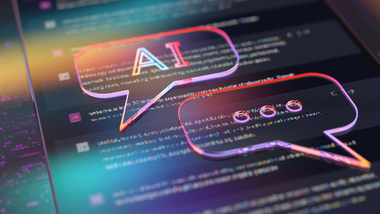How to Use AI to Streamline Your Business
Have you found yourself becoming more and more fascinated by all this talk of AI these days? Does the opportunity to drive more strategic growth and gain a competitive edge excite you?
With AI tools for your business, these outcomes — and more! — are certainly possible. Let’s explore how AI can help you unlock new opportunities and optimize business operations simultaneously.
How is AI used in workplace environments?
AI can enhance departments within your company. From marketing to human resources and everything in between, AI can handle tasks that would otherwise be too costly to hire people to complete. With AI, you can eliminate certain costs of labor because AI can handle large amounts of information — far more than one human being can.
What are some examples of AI tools?
AI technologies — such as natural language processing, generative AI, ChatGPT, computer vision, neural networks and deep learning — are more cost-effective. That’s why they have been adopted by businesses of all sizes — and are increasingly so, since they enable quicker and more informed decision-making processes compared to what human beings can output.
Tasks that AI performs
AI is often utilized as a way of enhancing data analytics, minimizing repetitive tasks, boosting efficiency and unlocking potential. Examples of AI applications often include customer service chatbots, applicant tracking systems for recruiting purposes and payroll platforms that can manage the accounting side of business.
Predictive analytics can process and analyze extensive datasets at incredible speeds. AI makes this possible by identifying patterns, behaviors and trends that you can then use to forecast outcomes based on existing and ongoing data.
Advanced data analytics can predict customer outputs, detect trends regarding employee turnover rates, estimate revenue on an annual or quarterly basis, and identify patterns of fraud. AI can also help you identify bottlenecks and personalize customer outreach with the help of data-based insight.
Just know that as effective and productive as AI tools are, the human touch is still invaluable. The expertise of people is a vital part of ensuring the accuracy and trustworthiness of key business operations. So while the assistance of AI is important, so is that of people.
What are examples of ways you can employ AI in your business?
AI has a lot of uses, namely the following:
- Content generation
- Customer service
- Marketing campaigns
- Human resources data collection
- Sales efforts
- IT operations
- Cybersecurity protection
- Content generation
AI can help you generate content in a way that is far faster than humans can do it. With tools such as ChatGPT, Gemini from Google and Copilot from Microsoft, you can easily input prompts that the AI tools will then use to generate content.
From outlines and emails to blog posts and newsletters, your options are endless. Plus, you don’t have to accept the outputs as is; instead, feel free to add your own creative touch by editing the copy before posting it.
Similarly, tools such as Midjourney, Stable Diffusion and DALL-E are available for instances where you need to generate images with the help of AI. The best part is that all you need to do is input text prompts; the AI tools then take and create pictures with these prompts, all based on what you tell AI to create.
Customer service
Have you ever wished you could get help with the management of your customers’ inquiries? You might have considered hiring an employee or two to assist you with customer service responses, but it’s not necessary, especially if you want to automate the process.
With AI, you can identify relevant insights that lead to an improvement in your customers’ experiences. Plus, AI makes it possible to provide your customers with availability and support 24 hours per day, all week long.
Marketing campaigns
When fast responses are a priority, you can use AI to deliver personalized messages based on consumer profiles. AI can also recommend products based on customers’ purchase history, come up with strategies to improve sales, set up marketing campaigns, optimize targeted messaging and identify opportunities for upselling or even selling across platforms.
Human resources data collection
Predictive analytics can be applied with the help of AI. You can screen job applicants more quickly by relying on AI to conduct background searches, like analyzing social media profiles and other digital footprints.
AI is also capable of helping you compare resumes, source information, recruit prospective job candidates, onboard new employees and manage HR-related records. AI tools also have the potential to encourage team development, write job descriptions and simplify training protocols in the workplace.
Let AI centralize your employees’ data, manage payroll, keep track of benefits, track employees’ time, maintain documentation of employee attendance rates and train employees.
Sales efforts
Want to create personalized emails and customize your recommendations for each of your customers? Look no further than AI tools that can help you better understand what your customers want and how they respond to measures you take within your business. AI can also help you predict future demand, find new leads, prioritize prospective customers and engage with your audience in the most effective ways.
IT operations
By integrating various AI-based IT operations, you can identify disruptions and outages before they snowball. That way, you can prevent what would otherwise be a serious problem and stop major issues from becoming overwhelming concerns.
Cybersecurity protection
With AI, you can enhance the security of your company. For instance, artificial intelligence can help reduce the risk of new threats by identifying patterns that could be indicative of fraudulent activity. AI is a way to use detection models that can be updated over time as well.
AI-powered machine learning can scan emails for suspicious IP addresses, links, keywords and attachments while cluing you in to emails that are highly likely to be spam. With AI, you can also differentiate between real website traffic versus falsified data and reliable versus predatory bots.
From compliance with rules and regulations to the identification of discrepancies and the ability to reduce the amount of time spent completing certain tasks, AI tools yield many benefits for businesses. But remember — most successful AI initiatives are powered by human expertise, so do your research and only implement the AI tools that make the most sense for your company.
©2024


